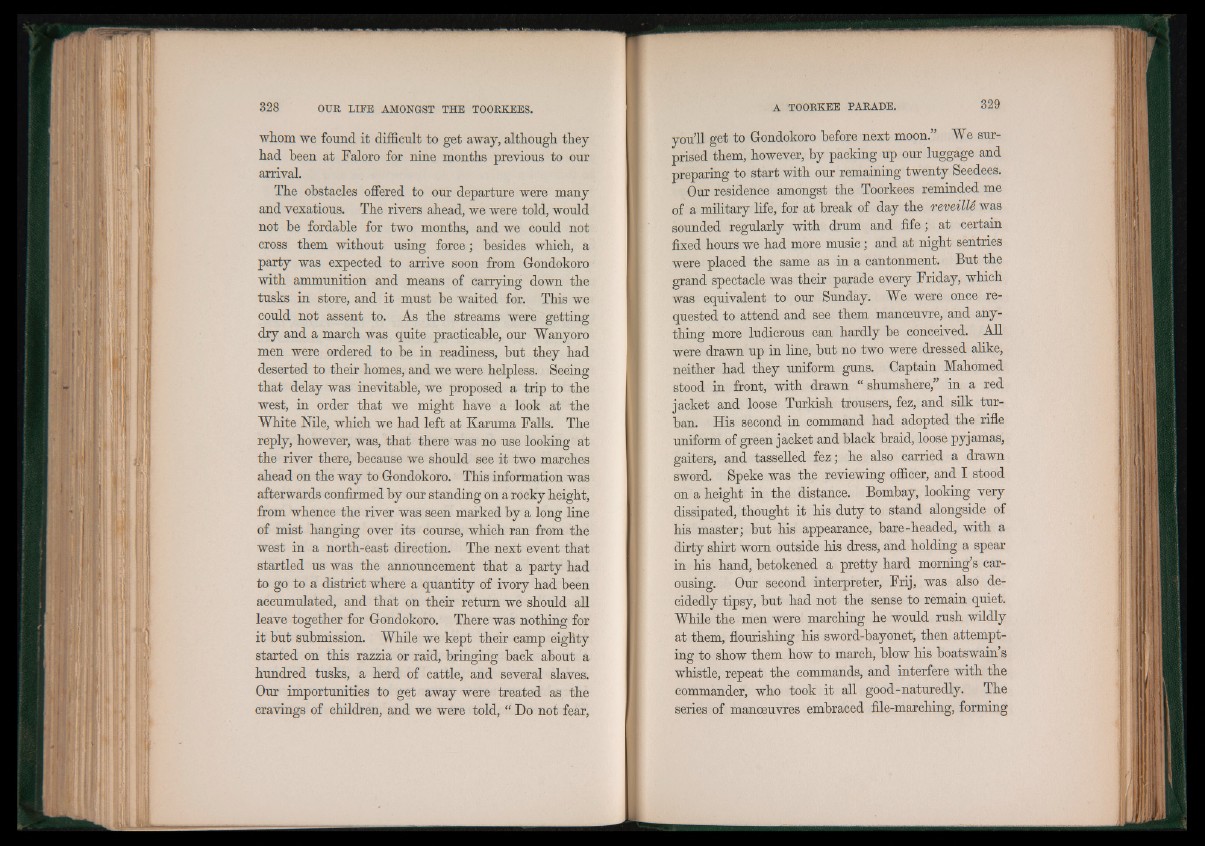
whom we found it difficult to get away, although they
had been at Faloro for nine months previous to our
arrival.
The obstacles offered to our departure were many
and vexatious. The rivers ahead, we were told, would
not be fordable for two months, and we could not
cross them without using force; besides which, a
party was expected to arrive soon from Gondokoro
with ammunition and means of carrying down the
tusks in store, and it must be waited for. This we
could not assent to. As the streams were getting
dry and a march was quite practicable, our Wanyoro
men were ordered to be in readiness, but they had
deserted to their homes, and we were helpless. Seeing
that delay was inevitable, we proposed a trip to the
west, in order that we might have a look at the
White Nile, which we had left at Karuma Falls. The
reply, however, was, that there was no use looking at
the river there, because we should see it two marches
ahead on the way to Gondokoro. This information was
afterwards confirmed by our standing on a rocky height,
from whence the river was seen marked by a long line
of mist hanging over its course, which ran from the
west in a north-east direction. The next event that
startled us was the announcement that a party had
to go to a district where a quantity of ivory had been
accumulated, and that on their return we should all
leave together for Gondokoro. There was nothing for
it but submission. While we kept their camp eighty
started on this razzia or raid, bringing back about a
hundred tusks, a herd of cattle, and several slaves.
Our importunities to get away were treated as the
cravings of children, and we were told, “ Do not fear,
you’ll get to Gondokoro before next moon.” We surprised
them, however, by packing up our luggage and
preparing to start with our remaining twenty Seedees.
Our residence amongst the Toorkees reminded me
of a military life, for at break of day the reveillé was
sounded regularly with drum and fife ; at certain
fixed hours we had more music ; and at night sentries
were placed the same as in a cantonment. But the
grand spectacle was their parade every Friday, which
was equivalent to our Sunday. We were once requested
to attend and see them manoeuvre, and anything
more ludicrous can hardly be conceived. All
were drawn up in line, but no two were dressed alike,
neither had they uniform guns. Captain Mahomed
stood in front, with drawn “ shumshere,” in a red
jacket and loose Turkish trousers, fez, and silk turban.
His second in command had adopted the rifle
uniform of green jacket and black braid, loose pyjamas,
gaiters, and tasselled fez; he also carried a drawn
sword. Speke was the reviewing officer, and I stood
on a height in the distance. Bombay, looking very
dissipated, thought it his duty to stand alongside of
his master; but his appearance, bare-headed, with a
dirty shirt worn outside his dress, and holding a spear
in his hand, betokened a pretty hard morning’s carousing.
Our second interpreter, Frij, was also decidedly
tipsy, but had not the sense to remain quiet.
While the men were marching he would rush wildly
at them, flourishing his sword-bayonet, then attempting
to show them how to march, blow his boatswain’s
whistle, repeat the commands, and interfere with the
commander, who took it all good-naturedly. The
series of manoeuvres embraced file-marching, forming